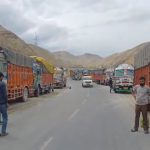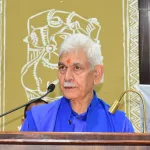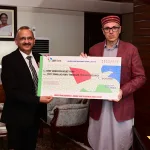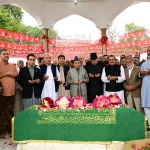Srinagar, Aug 18: In a significant step towards strengthening agricultural research and innovation in the Kashmir Valley, a high-level delegation from the International Crops Research Institute for the Semi-Arid Tropics (ICRISAT), Hyderabad visited the Dryland Agriculture Research Station (DARS), Rangreth, of Sher-e-Kashmir University of Agricultural Sciences and Technology of Kashmir (SKUAST-K).According to a statement issued here, the team was led by Dr. Stephen Blade, Deputy Director General, (Research and Innovation) at ICRISAT, accompanied by Dr. Manzoor Hussain Dar, Global Head (Seed systems), and Dr Damaris A. Odeny (Cluster Leader) for Genomics and Trait Discovery ICRISAT. The visit marks a new chapter of collaboration between SKUAST-Kashmir and ICRISAT, Hyderabad in advancing sustainable agricultural practices, crop improvement, and climate-resilient technologies for the Himalayan region.The programme commenced with a warm welcome address by Dr. Zahida Rashid, Senior Scientist, DARS Rangreth. This was followed by a detailed presentation by Prof. M. Ashraf Bhat, Associate Director Research, DARS, SKUAST-K, who highlighted the ongoing research initiatives and technological interventions being pursued at DARS for developing high yielding and climate smart varieties that can pave a way forward for food and nutritional security in the region. He cautioned about harmful impact of climate change in temperate agro-climatic conditions. Prof. Haroon R. Naik, Director Research, SKUAST-K, graced the occasion as the Guest of Honour, offering a comprehensive overview of the university research priorities and achievements. He underscored the importance of partnerships with global institutions like ICRISAT in addressing the challenges of food security, climate variability, and livelihood improvement in the Himalayan context.The Chief Guest expressed great satisfaction with the quality of research and developmental work being carried out at SKUAST-Kashmir in general and at DARS in particular. He appreciated the commitment of the university scientists towards addressing region-specific agricultural challenges, particularly in dryland and climate-vulnerable areas. He desired that National and International Institutes must work in consonance on common mandated programmes to develop climate resilient varieties which can help to strengthen the economy of the farming community especially in Dryland Agriculture.
ICRISAT, Hyderabad joins hands with SKUAST-K
Move to strengthen & foster innovative research in Dryland Agriculture in Kashmir
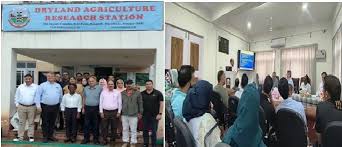
Sign Up For Daily Newsletter
Be keep up! Get the latest breaking news delivered straight to your inbox.
By signing up, you agree to our Terms of Use and acknowledge the data practices in our Privacy Policy. You may unsubscribe at any time.
Leave a Comment Leave a Comment
Stay Connected
Latest News
Recent Posts
- LG Sinha calls for innovation-driven sustainable development at Jammu University Foundation Day
- High Court donates Rs. 54,40,500 to CM’s Relief Fund
- NC President Farooq Abdullah, CM Omar pay tributes to former CM Sheikh Abdullah on his death anniversary
- Nine dead, curfew imposed in parts of Nepal as ‘Gen Z’ protest over social media ban turns violent
- Rohit Bhat, Festival Director TIFFS Calls on LG Sinha



